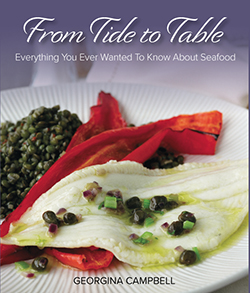Cookery Feature - Time To Go Organic
There’s never been a better time to make the case for organic food production and its potential in Ireland is massive. With Green issues including climate change at the top of the political agenda, plus concerns about the possible fall-out if there’s a no-deal Brexit and WTO rules are introduced, there’s a unique opportunity to do the right thing by the environment and build on Ireland’s reputation as a quality food producer at the same time. And perhaps we could even bite the bullet and go for the ultimate prize: Ireland as an organic food island…?
But, even if only working to increase production within our growing organic sector, the benefits for both Irish farmers and consumers would be beyond immense. The demand for organic food has always outstripped supply and it’s shameful that we continue to import vast quantities of premium foods that could easily be produced (and, in many cases, also processed) here instead, and then promoted and enjoyed as local produce.
.jpg) Thinking back on it, it’s amazing how farming has changed in little more than half a century - for anyone growing up more than 50 or 60 years ago, organic farming was more or less the norm; it didn’t need a label, it was just traditional farming. But cheap food policies and the intensive farming systems that went with them changed all that after World War Two. With the drive to increase yields dramatically and – crucially - to produce cheap food, the holistic traditional mixed farm was in the line of fire. But, now that we’re coming full cycle and acknowledging the damage that intensive production can bring, it’s time for traditional extensively produced food (mainly, but not necessarily, ‘organic’) to get the recognition - and command the price - that it deserves.
Thinking back on it, it’s amazing how farming has changed in little more than half a century - for anyone growing up more than 50 or 60 years ago, organic farming was more or less the norm; it didn’t need a label, it was just traditional farming. But cheap food policies and the intensive farming systems that went with them changed all that after World War Two. With the drive to increase yields dramatically and – crucially - to produce cheap food, the holistic traditional mixed farm was in the line of fire. But, now that we’re coming full cycle and acknowledging the damage that intensive production can bring, it’s time for traditional extensively produced food (mainly, but not necessarily, ‘organic’) to get the recognition - and command the price - that it deserves.
Organic food has certainly come in out of the culinary wilderness in recent years and, as an increasing number of mindful consumers see it as a mainstream alternative, it’s far from being the niche area that it was. After all, if we care about the quality and provenance of what we’re putting into our mouths - and, especially, our children’s mouths - it obviously makes sense to choose food that will protect our health rather than undermine it and cause problems in years to come. But ‘organic’ is perceived as ’expensive’, and something that’s harder to get across – given the massive emphasis on low prices in all of our main food shops – is that quality has a value. We need to educate the next generation of shoppers to recognise that cheap food is a false economy, and unsustainable.
There’s also the problem of a general sense of entitlement to cheap food, which has persisted since WW2 even though there’s no logic to it. It’s obvious that, to get quality and support our producers and the local economy, we must be prepared to spend more on food. When seen as an investment, lower health bills alone could well offset any extra food costs, with benefits such as reduced obesity levels putting less strain on the health system as well as improving the quality of life for many people. And we can also be more imaginative in the ingredients we choose, make savings by opting for less expensive cuts of high quality food - and, given those obesity problems, adopt the motto ‘eat less, but better’.
And early autumn, when fresh seasonal Irish produce is at its most abundant and next year’s crops are being planned, is the perfect time to think about it. However you look at it, the potential is huge. More people are producing food organically in Ireland now, but it could be far, far more - and, once economies of scale come into play, prices would become more attractive too, so that’s a win-win all round, especially when environmental benefits including the health of our soil and rivers are taken into account. Imaginative schools food programmes (often the result of initiatives by group such as GIY) are among the measures that are beginning to turn the tide and, once children get involved they aren’t shy in ‘educating’ their parents - so changes for the good in consumer habits could come much sooner than we think.
Find out more from the Irish Organic Association, The Organic Trust, and Bord Bia who will be hosting the National Organic Awards through a hybrid event, with both virtual and real life elements, this year on Wednesday October 21st 2020 at 3pm.
RECIPES:
 Soft Boiled Organic Eggs and Organic Smoked Salmon Bagels
Soft Boiled Organic Eggs and Organic Smoked Salmon Bagels
Irish Organic Salmon is farmed in the deep, strongly tidal waters off the West coast, notably Clare Island in Clew Bay, Co Mayo (one of the world’s first certified organic salmon farms) and is renowned for its flavour and muscular texture. It goes perfectly with organic eggs – which are now becoming more widely available, as more organic producers go into poultry and egg production. If preferred, the salmon in these bagels could be replaced with slices of cooked ham - or try wilted spinach for a vegetarian alternative. Serves 4
4 large organic eggs, eg Clonarn Clover, Connolly’s or Nest Box
2 bagels
butter, for spreading
200g/7oz packet organic smoked salmon slices
30 ml/2tbsp crème fraîche
1 tsp fresh chives, chopped
Sea salt and freshly cracked black pepper
Place the eggs in a small pan of water and boil for 5 minutes, then drain and plunge into a bowl of iced water. Set aside for 10 minutes as this will make them much easier to peel.
Preheat the grill to high.
Cut the bagels in half and arrange on a grill rack. Cook for 1-2 minutes until toasted, then spread with a little butter.
Place the toasted bagel halves on warmed plates and ruffle the smoked salmon slices on top. Add a dollop of crème fraîche.
Shell the eggs and cut each one in half, then arrange on top of the smoked salmon and crème fraîche.
Season to taste and sprinkle with the chives to serve.
 Beetroot, Goats' Cheese and Walnut Salad
Beetroot, Goats' Cheese and Walnut Salad
The simplicity of this pretty dish allows quality ingredients to speak for themselves: with its lovely delicate herbal flavours, naturally produced St Tola goats’ cheese from Co Clare contrasts well with sweet and deeply coloured beetroot to make a deliciously subtle starter or light lunch. Awareness of the health benefits of beetroot has seen its popularity soar and it’s widely grown by organic farmers such as the McNally Family Farm and Beechlawn Organic Farm who grow a wide range of top quality vegetables. Be careful to use fresh walnuts, as they spoil and take on a bitter flavour when stored for too long; look out for organic nuts, or by online at, for example, Green Earth Organics
Serves 2-4
A selection of seasonal salad leaves
115g/4½ oz St Tola or other soft organic goats' cheese
3 beetroots, cooked and peeled
10-15 fresh walnuts, coarsely chopped
Dressing:
15ml/1tbsp balsamic style vinegar eg Highbank Orchard
45m /3tbsp extra virgin olive oil/premium Irish rapeseed oil eg Second Nature
2.5m/½ tsp Dijon style mustard, eg Bunalun
Wash and dry the salad leaves.
Put a small handful of leaves onto each plate.
Slice the goats' cheese and beetroot into wedges and place 2-3 of each onto each plate. Sprinkle the walnuts over the salads.
Put all the ingredients for the dressing into a small bowl or screw-top jar and mix well to emulsify.
When ready to eat, sprinkle the dressing over the salads and served with freshly baked crusty bread.
 Greek-style Lamb Kebabs with Yoghurt Dressing
Greek-style Lamb Kebabs with Yoghurt Dressing
Organic lamb benefits from the extra herbs and floral flavours that a natural farming system encourages – especially the late season hill lamb raised in mountainous areas, such as Achill, Connemara, Kerry and West Waterford, which is in season now and available from local butchers, markets and, in some cases, from the farm or online. Further information from: Connemara Mountain Lamb; Achill Mountain Lamb; Ring of Kerry Quality Lamb; Comeragh Mountain Lamb The organic vegetables, herbs and yoghurt (eg Glenisk) for this recipe are all widely available, from farmers’ markets, specialist stores and good supermarkets. The kebabs would be equally delicious cooked on the barbecue or under the grill. Serves 4
750g/generous 1½ lb premium lamb, well trimmed and cubed
Olive or other good quality oil, eg organic Irish rapeseed oil
1 red and 1 green pepper, cut into chunks
1 red onion, cut into wedges
Salt and freshly-ground black pepper
Marinade:
250ml/9 fl oz natural yoghurt, eg Glenisk or Glenilen
2 garlic cloves, crushed
5 ml/1 tsp ground cumin
5 ml/1 tsp ground coriander
Grated rind and juice of 1 lemon
Yoghurt Dressing:
185ml/6½ fl oz natural yoghurt
15 ml/1 tbsp fresh coriander, chopped
15 ml/1 tbsp fresh mint, chopped
Grated rind of 1 lemon
2 garlic cloves, crushed
Combine the marinade ingredients in a large non-metallic dish.
Add the diced lamb and stir to coat well, then cover and place in the fridge for about 2 hours if possible.
Meanwhile soak 8 wooden skewers in water, to prevent them scorching. (If you are short of time use metal skewers.)
Preheat your barbecue or grill to high and brush lightly with oil.
Thread the lamb cubes, peppers and red onion onto the skewers, season and cook for 3-4 minutes on each side until lightly charred and cooked to your taste.
To make the Yoghurt Dressing: stir together all the ingredients and season to taste. Drizzle a little dressing over each lamb skewer and serve the rest on the side.
Serve with new season potatoes and salad.






There are currently no comments
Leave a comment
Not a member? Register for your free membership now!
Or leave a comment by logging in with: